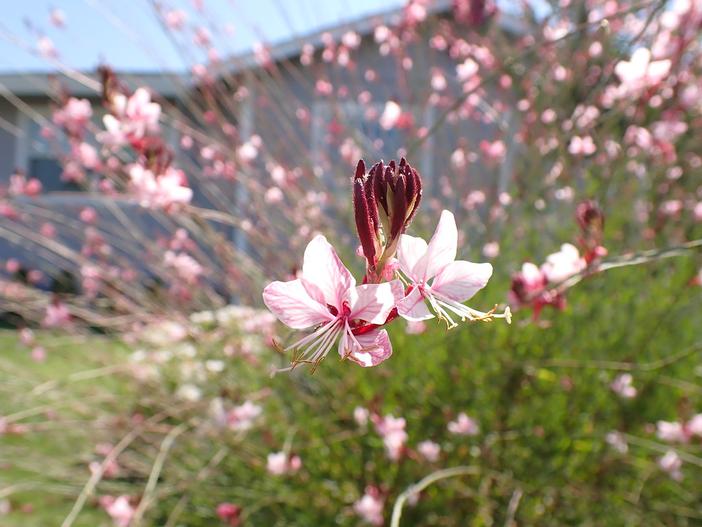Lindheimer’s Beeblossom
(Oenothera lindheimeri)
Lindheimer’s Beeblossom (Oenothera lindheimeri)
/
/

Matt Lavin
CC BY-SA 2.0
Image By:
Matt Lavin
Recorded By:
Copyright:
CC BY-SA 2.0
Copyright Notice:
Photo by: Matt Lavin | License Type: CC BY-SA 2.0 | License URL: https://creativecommons.org/licenses/by-sa/2.0/ | Uploader: Matt Lavin | Publisher: Flickr
































































Estimated Native Range
Summary
Oenothera lindheimeri, commonly known as Lindheimer’s Beeblossom, is a perennial herbaceous plant native to prairies and open woodlands in Texas and Louisiana. It typically grows to a height of 50 to 150 centimeters (20–60 inches) and is characterized by its tall, slender stems and willowy form. The plant produces a profusion of delicate white to pink flowers from early summer to fall, which are highly attractive to pollinators. The flowers open in the evening and close by the next afternoon, often changing color as they age. The plant’s foliage is narrow and lance-shaped, adding a fine texture to garden settings.
Lindheimer’s Beeblossom is valued for its drought tolerance and long blooming period, making it a popular choice for xeriscaping and low-maintenance gardens. It is used in garden beds or pots for accent color and its airy texture. While it is hardy in USDA Zones 5(6)-9, it may not overwinter reliably in colder regions and can be treated as an annual or protected with heavy winter mulch. Cultivars like ’Whirling Butterflies’ with nearly pure white flowers, and ’Cherry Brandy’ and ’Siskiyou Pink’ with darker pink blooms, offer gardeners a variety of color options. This plant thrives in full sun and requires well-drained soil. It is generally easy to care for, needing only moderate watering once established. However, it can be potentially invasive outside its native range, so gardeners should check local guidelines before planting.CC BY-SA 4.0
Lindheimer’s Beeblossom is valued for its drought tolerance and long blooming period, making it a popular choice for xeriscaping and low-maintenance gardens. It is used in garden beds or pots for accent color and its airy texture. While it is hardy in USDA Zones 5(6)-9, it may not overwinter reliably in colder regions and can be treated as an annual or protected with heavy winter mulch. Cultivars like ’Whirling Butterflies’ with nearly pure white flowers, and ’Cherry Brandy’ and ’Siskiyou Pink’ with darker pink blooms, offer gardeners a variety of color options. This plant thrives in full sun and requires well-drained soil. It is generally easy to care for, needing only moderate watering once established. However, it can be potentially invasive outside its native range, so gardeners should check local guidelines before planting.CC BY-SA 4.0
Plant Description
- Plant Type: Herb
- Height: 0.8-1.5 feet
- Width: 1-2 feet
- Growth Rate: Moderate
- Flower Color: Pink, White
- Flowering Season: Spring, Summer
- Leaf Retention: Semi-deciduous
Growth Requirements
- Sun: Full Sun
- Water: Medium
- Drainage: Medium
Common Uses
Bank Stabilization, Bee Garden, Bird Garden, Border Plant, Butterfly Garden, Deer Resistant, Drought Tolerant, Fire Resistant, Fragrant, Groundcover, Hummingbird Garden, Low Maintenance, Potted Plant, Rabbit Resistant, Rock Garden, Salt Tolerant, Showy Flowers, Street Planting
Natural Habitat
Prairies and open woodlands in Texas and Louisiana
Other Names
Common Names: White Gaura, Pink Gaura, Lindheimer’s Clockweed, Indian Feather, Sommarljus
Scientific Names: , Gaura lindheimeri, Oenothera lindheimeri, Gaura hirsuta, Gaura filiformis var. munzii,
GBIF Accepted Name: Oenothera lindheimeri (Engelm. & A.Gray) W.L.Wagner & Hoch